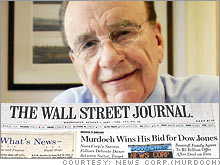Why I'm glad Rupert wonThe Wall Street Journal will be a better paper for the world of modern media now that News Corp. has won its prize, says Fortune's David Kirkpatrick.NEW YORK (Fortune) -- I'm glad Rupert Murdoch is buying Dow Jones. He is likely to be a far more responsive steward of the Wall Street Journal brand and a more aggressive marketer of its news than the paper has had. In the fundamentally-changed Internet era of media, the Journal has been waning, and without radical change would likely decline further in both quality and impact. But now radical change has come. So why can Murdoch, apparently alone among moguls and media colossi, confidently pay so much for Dow Jones? Because he has run his own media company better than almost any other and has diligently worked to understand what it means to run a media property in the Internet age. His signature Web property, MySpace, is the most trafficked U.S. destination. News Corp. President Peter Chernin said this week that its revenues are on track to "approach one billion" in the just-begun News Corp. fiscal year. News Corp (Charts, Fortune 500). paid in the vicinity of $600 million for MySpace two years ago. Dow Jones (Charts) spent only a little less - about $520 million - to buy Marketwatch, whose traffic and overall online impact are relatively minuscule.  Murdoch is the one major media company CEO who has shown that he not only can spout rhetoric about the Net's importance but will take the risks and spend the money necessary to seize the new opportunities. He's already been augmenting MySpace, for example, recently buying Photobucket for a reported $250 million. And MySpace has taught News Corp. critical lessons about the two-way dialog that is media on the Web. It's not enough merely to put quality news and entertainment online. To succeed with today's customers, you have to realize they are not just readers and viewers. You have to let them help create their own online experience, as MySpace probably does better than any other major consumer online business. That's what those famously-chaotic MySpace profiles are really all about - user control. Expect over time to see radical changes in the degree to which the Journal pulls its readers in as partners in gathering and disseminating news. It has been a point of near-religious pride at Dow Jones that WSJ.com is a closed subscription-only site. It's profitable! hooray. But thus only a very limited universe of readers can read the Journal. I wrote in May that I think that model is a mistake. The Journal itself has, granted, made changes recently to make parts of its news coverage more accessible to everyone, and reorganized its editing process to better integrate print and Web news. But now Murdoch himself has mused in Time and elsewhere that it might make sense to open up WSJ.com completely. When I write a column I often include links to articles elsewhere on the Net. Linking is part of the currency of modern journalism. But there are many pieces in WSJ.com I won't link to because only paid subscribers could read them. Being part of the dialog is critical to relevance in modern journalism. There is today less need for the Journal to perform the role it played so well for many decades - as the newspaper of record for business news. In the Internet era the number of organizations committed to reporting and analyzing business news in real time has exploded. The Journal has thus become just one source of many. The onus is on the Journal to show why it matters in the radically-altered media landscape. Word on the street has it that many anti-Murdoch Journal staffers are restive and considering leaving. My guess is that the paper they would flee is likely to become one that many of us want to read, whether its content is on dead trees or in the pixelated ether. |
Sponsors
| |||||||||||

